Andrius Kubilius © Epp.eu
Andrius Kubilius is a mild-looking Lithuanian politician who feels deep antagonism towards Vladimir Putin and his followers. Kubilius helped to campaign for the independence of his native land during the break-up of the old Soviet Union and now wants tougher measures to be taken against the Russian Federation that Putin leads to protect others from attempts to put them back under Russian control. “As Ukraine is fighting alone in Europe’s existential war, a simple question has been on the minds of both Ukrainians and many Lithuanians,” Kubilius wrote in a newspaper article earlier this year, “Why does the West not impose a ‘no-fly zone’ over Ukraine’s territory, thus protecting Ukrainian towns and cities from Russian bombers, fighter jets and missiles?” Kubilius is in a good position to pose that question and demand an answer, as chairman of the Euronest Parliamentary Assembly, a body intended to bring the former Soviet satellites closer to their western equivalents and facilitate easier dialogue amongst them. He posed it in his opening speech for 9th plenary session of the Euronest Parliamentary Assembly (EPA), stressing that “the Eastern Partnership region requires immediate attention and clearer EU leadership in this neighbouring region.” He has a point, but it’s hard for a body created as a peaceful union of non-aggressive partner nations hoping for an easier exchange system for agricultural or manufactured goods to start talking tough and throwing its collective weight around.
Within the EPA, members of the European Parliament exchange views and endeavour to forge closer political and economic ties with members of the national parliaments of Ukraine, Moldova, Armenia, Azerbaijan and Georgia so that they can develop at least a commercial friendship with their opposite numbers. The idea is based on the principle that we could all get on in friendship (and fair commercial competition) if only we knew each other better. It’s a laudable idea but not one that appeals to Vladimir Putin and his pals. Good intentions are simply not enough, especially when dealing with a militaristic and ambitious person like Putin, who has a great many weapons and troops at his disposal, if not quite as many as he wishes or would like us to believe.

Welcome address by the president of the European Parliament, Prof. Jerzy Buzek, at the Euronest Constituent Meeting, Brussels, 3 May 2021 © European Union
“Instability is becoming a new trait of the Eastern Partnership region,” wrote Kubilius. “We see numerous important changes here, and they aren’t always easy to deal with positively.” It would, of course, have been too much to expect the Soviet Union’s member states to switch smoothly to our western version of representative democracy without some hiccups and misunderstandings along the way. And there have been quite a few. “For example, changes related to democracy in Belarus, security challenges in Ukraine with the Kremlin massing its forces on its borders (this was written by Kubilius in the Lithuania Tribune newspaper at the end of April 2021, before the invasion of Ukraine began in earnest), challenges to the maturity of democracy in Georgia and the presidential elections in Moldova, which Maia Sandu (a pro-EU economist) won. And the tragic armed conflict between Armenia and Azerbaijan as well.” Kubilius also noted that changes within Russia itself could impact on Eastern Europe, although presumably not quite as dramatically as an armed invasion and a bombing campaign.
Now it begins to look as if Russia’s boast of near invincibility was the lie that most people in the West always hoped it would be, with Ukrainian troops retaking some 2,6002 kilometres of territory in the Karkiv region in a single weekend. It’s not just the myth of Russia’s military superiority that has taken a severe knock, of course , but the reputation of Putin himself.

Ukrainian troops in the settlement of Hoptivka. September 2022. Ukraine. © Frame from a video of the Ministry of Defense of Ukraine
Rumours are starting to circulate that his days are almost certainly numbered. In an interview for Charter 97, Kubilius was asked why Putin had chosen to go to war. He replied that: “A major reason is that he started to feel that his regime is becoming weaker and weaker. Putin saw the whole panorama how authoritarian regimes in the entire post-Soviet area are starting to lose the loyalty of the people.” Kubilius has proved a skilled observer of Russian politics, which appear as convoluted and complex as the Renaissance court of Florence at the time of the Medicis. “And, of course,” he continued, “the Belarusian developments in 2020 were a major breakthrough showing that people do not want any more to live with the same dictator for 27 years.” We should recall that Cosimo di Medici was a successful banker, not a politician, but he was hugely powerful. “Political questions are settled in Cosimo’s house,” it was said in the early 15th century. “The man he chooses holds office… He it is who decides peace and war… He is king in all but name.” That may be the sort of position Putin would like to hold himself, but Kubilius is determined to ensure that never happens.
WHO’S WINNING? WHO’S PAYING?
“In my view,” Kubilius said, “Putin made a major mistake. He will lose the war. He is losing in the military fields of Ukraine, and he is losing in his economy against Western Sanctions. Sanctions are really hitting very heavily, and they will be even broader.” There have even been calls in Russia to charge Putin with treason for his reckless and ultimately humiliating actions in Ukraine, such as this: “The Smolninskoye Council decided to appeal to the State Duma deputies with a proposal to bring charges of treason against President Putin to remove him from office. The decision was supported by the majority of deputies present,” the politician emphasized. The authors of the letter said they had asked to bring charges of high treason against the head of state “to remove him from office.”
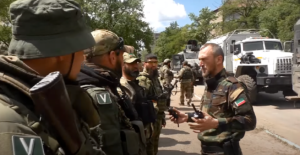
It may not be as easy as that; we’ve had similar events before and yet Putin survives. Even so, it begins to look as if some of his allies are having a change of heart, people like the Chechen leader, Ramzan Kadyrov, who has criticised the Russian Army’s performance in Ukraine after its humiliating defeat in Izyum, which has been seen as a critical supply hub in Ukraine’s eastern region around Kharkiv. Kadyrov was quoted in Novaya Gazeta Europe as saying: “I’m not a strategist like those in the defence ministry. But it’s clear that mistakes were made. I think they will draw a few conclusions”. Smolninskoye is a district of St. Petersburg, thought to be faithful to Putin as a ‘local lad made good’. But the Russians love a winner, and Putin is beginning to look more like a loser.
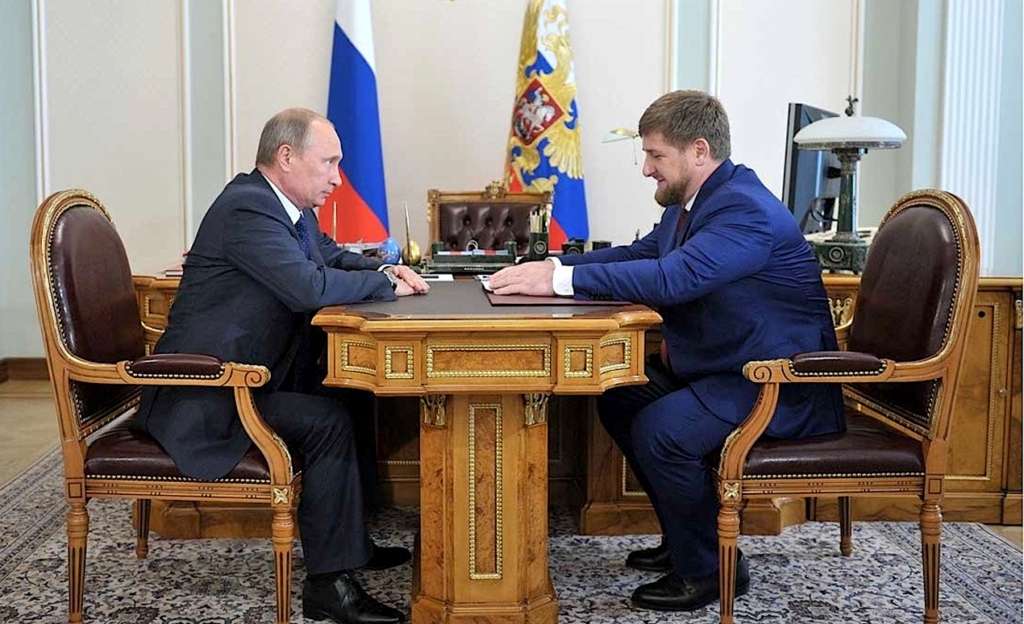
This is the cue for Andrius Kabilius to weigh in with a warning to those dithering on the periphery. He has told Serbia’s top politicians that it’s becoming clearer that Putin is losing the war and that it’s time for Serbia to pick the winning side. He told them that Serbia should clearly define its position, because the whole country’s future may depend upon it. “I think it is better to be on the side of those who will win and not with those who make them lose the war,” Kubilius warned them. He has also been calling for a total embargo on Russian exports, especially oil and gas, for a very long time. Only that way can the countries that rely on it, such as Germany, avoid action by Russia to restrict it, which has now happened, of course. Putin believes, not unreasonably, that the coming winter will be on his side. Gas and oil make up some 60% of Russia’s exports to the EU and the money they generate is what pays for new tanks, aircraft, and missiles to launch against Ukraine. Of course, Putin has made it clear in the past that he does not view the EU as important. Even so, as Kubilius has pointed out before, Putin is keen to associate himself with anti-EU figures and minority leaders within the EU, people like Hungary’s Viktor Orbán, the Prime Minister of Hungary (now branded an “electoral autocracy” by MEPs), and France’s far-right Marine Le Pen, or Geert Wilders from the Netherlands. Anyone threatening consensus inside the EU is a potential friend for Putin, or at least a figure Putin can use to whip up more unrest. Even so, Orbán was obliged to condemn Putin’s invasion and to allow NATO forces and weapons to pass through Hungary on their way to the front.
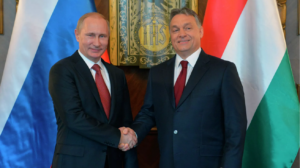
Putin continues to trot out his favourite lie that Ukraine is really a part of Russia and is only separated from it because of the “nazis” in power there. One of Putin’s allies predicted that in a year or two from now Ukraine would no longer appear on any map. Another, commenting on the discovery of the body of a British man among the dead, argued that it proved the UK is at war with Russia and that Putin should “aim hypersonic missiles” at Britain.
According to Charter 97, Kubilius also has harsh words for Putin’s ally, Alexander Lukashenko, president of Belarus but seen by many (including Kubilius) as Putin’s puppet. Indeed, he is dismissive of Lukashenko’s right to govern at all. “Lukashenko for many years since the beginning of his authoritarian regime has been the Kremlin’s slave and a powerless servant of President Putin,” Kubilius argued. “He had a chance to side with the Belarusians themselves in 2020, but ultimately he decided to stand against his own people and continue serving the Kremlin.” Faced with the possibility of standing stoutly against Moscow many minor leaders have decided that the risk is just too great.
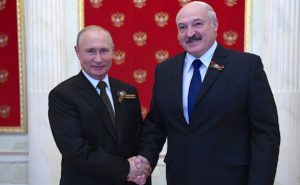
KUBILIUS IN CLOSE-UP
So just who is this mild-looking and quiet politician who, nevertheless, feels tough enough to take on Russia’s KGB-linked President, Vladimir Putin, whose ambition it would seem is to take over all the former Soviet lands and lead them against the western nations. Kubilius was born in December 1956 in Vilnius, Lithuania’s capital, and studied physics at Lithuania University. He became a member of the Sąjūdis movement, favouring independence from the Soviet Union, although it was not easy back then to do so. He did, however, going on to become Executive Secretary of the Sąjūdis Council. Involving himself more in politics, he chose to represent the Homeland Union, the Lithuanian Christian Democrat party, which made him a key figure in the independence movement.
He led his party into the 2008 general election, in which his Conservatives defeated the Social Democrats, being appointed Prime Minister shortly afterwards. He received 89 votes, against just 27 and with 16 abstentions. In 2008 he became the first Prime Minister of Lithuania to serve out a full term in what was a famously precarious post. It was also the year of a huge financial crisis, causing the greatest global recession since 1929, mainly due to massive deregulation and inequalities in the United States, plus the failure of Lehman brothers. “On both sides of the Atlantic,” wrote economist Thomas Piketty, Director of Studies at the École des hautes études en sciences sociales at the Paris School of Economics, in an article for Le Monde entitled ‘Such a Long Recession’, “Economic activity fell by about 5% between the end of 2007 and the beginning of 2009; this made it the most serious world recession since the crisis in the 1930s.” Recovery did begin – slowly – but it was mainly in the US. “In Europe growth finally began again modestly at the beginning of 2013,” wrote Piketty, “but the damage had been done: by the end of 2015, GDP in the Euro zone had still not exceeded its level at the end of 2007, whereas the United States had experienced cumulative growth of over 10% between 2007 and 2015.”
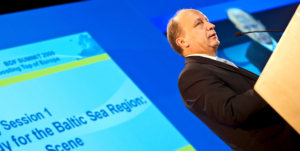
Kubilius supported a controversial austerity programme that saw Lithuania recover from its economic woes. Some constituents, according to one website, consider him to be the best Prime Minister Lithuania ever had, emerging from economic austerity in record time, which led to him being elected to the European Parliament in 2019. As Executive Secretary of the Sąjūdis Council, he has remained an active and highly influential figure in Lithuanian politics, helping to forge the Homeland Union–Lithuanian Christian Democrats group in 1993.
Apart from serving on the committees for Foreign Affairs and Industry, Research and Energy, he became rapporteur on his country’s relations with Russia. He later said that it is “impossible” to have good relations with Russia and called on the EU to phase out its imports of Russian oil and natural gas. He also praised Turkey for standing up to Russia and for “proving thrice (in Syria, Libya and Nagorno-Karabakh) that the Kremlin,” as he put it, “fears the fist”. With Russia’s recent reversal at the hands of Ukrainian forces, there are growing calls in Russia – especially, oddly, in Putin’s old stomping ground, Saint Petersburg, to oust the Russian leader from the Kremlin and even to prosecute him for treason. Kubilius has pointed out before that Russia can change and become a fully democratic country, hard as that may be to imagine. An assessment earlier this year drew the conclusion that it’s necessary to distinguish between the Russian people and Putin’s regime which is described as a “stagnating authoritarian kleptocracy led by a president-for-life surrounded by a circle of oligarchs”. Kubilius has reminded MEPs that they must continue to push back against Russia’s aggressive policies while “laying the groundwork for cooperation with a future democratic country”. We mustn’t forget, of course, that even if this scenario is played out for real, it will also remain an extremely LARGE country, by far and away the largest in the EU, were it ever to join, which currently seems most unlikely.
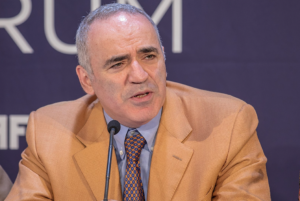
CASTLING THE KREMLIN
The great Russian chess master, Gary Kasparov told the Kyiv Post that the attitude towards the war among ordinary Russians is changing. As the wounded return from the front, Russian citizens are coming to realise that their country’s armed forces are not invincible and the death toll among its troops is thought to have reached 50,000 or perhaps more. “There’s a factor that’s underestimated by the West: it’s the psychological factor,” Kasparov told the newspaper. “Morale is always a problem, just as is military equipment. And today, the morale of the Russian soldiers is deteriorating. Alternatively, it seems that the Ukrainians are at the point where they’re willing to bear any cost to liberate their country and defeat the enemy.” We can assume, I imagine, that Putin’s calculation was based on the total lack of resistance when his forces seized Crimea. He must have felt very confident that armed opposition would simply melt away. But the world today is a different place and those countries that have acquired democracy are very reluctant to let it slip through their fingers. Putin’s staunchest allies now, apart from Belarus and its lapdog leader, are the oligarchs still profiting from doing dubious deals. Turning a profit, though, will become more difficult for them as their country is increasingly isolated in response to Putin’s aggression.

As for Kasparov, he may see castling as a valuable move in chess, bringing the rooks more into the game and thereby making them more useful while placing your king in a safer position, but it depends on just how cleverly used your rooks are in play. Putin appears to be increasingly dependent on flexibility and movement, even though those options are getting more and more difficult to apply. There are questions, too, regarding nuclear weapons; will Putin dare to use them? There is an old saying in English: “never dare a fool”. We have to hope that Putin isn’t as big a fool as that. But there again, like many others, I never thought he would order the invasion of Ukraine. It was a foolhardy and dangerous move that was not necessary, but it has dramatically changed the political landscape for Europe. Writing in the Lithuania Tribune, Kubilius said: “The most important question for Europe in the next decade will be the question of Ukraine. Because therein lies the answer to the other two important questions: What will be the Europe of the future (in what environment will it exist?), and what will Russia be like, even after Putin? Without an answer to these questions, Europe will return to business as usual, not only in its relations with Putin but in all the other geopolitical failures of the EU in these decades, which led to war.” It’s a sobering thought. Kasparov believes that Putin wants to avoid measures that will bring NATO directly into the war he started. “Basically, the war is lost,” Kasparov told the Kyiv Post. “If you look at all of the objectives that Putin set for the war, all of them have failed. All of them. So, continuing the war is the only way for Putin to stay in power. He wants to create extra chaos in the free world hoping that a new window will open for him. It’s really just a protracted agony. It is cynical and stupid, but Putin is willing to put thousands of civilians into graves in the months to come before the whole of Ukraine is liberated, if that will allow him to maintain power.”
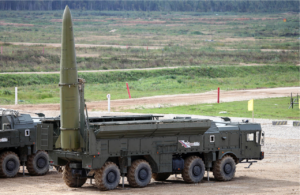
With conspirators increasing in number wanting to regain trading advantages by removing him, it would seem that the future for Putin begins to look rather bleak. We must be wary, however: if he sees that he has nothing to lose, that could be the trigger to resort to the use of nuclear weapons, which would be a real global catastrophe.
Kubilius has described Russia’s war in Ukraine as ‘brutal’, which few would dispute, describing the conflict as: “A war started by a madman who is scared that Ukraine, having chosen and defended its European integration course back on the Maidan in 2014, can become a successful, European state. And that would be the greatest danger for the Kremlin because the example of Ukrainian democracy might infect ordinary Russians.” Is Putin worried? Presumably he is, but he has backed the West into a corner from which it has been forced to act. “We believe that the free world must do everything to help Ukraine win,” said Kasparov, “There’s no other solution: Unconditional victory of Ukraine – and the unconditional defeat of Putin.” In Kasparov’s view, the status of Crimea, seized by Putin, must play a part, too. “The only chance to defeat Putin’s fascism is to raise the Ukrainian flag in Sevastopol, Crimea. That’s the top priority for anyone who wants to see our planet safe from Putin’s existential threat of destruction.” Of course, we must not forget that even with Putin out of the picture (if that happens) it doesn’t mean peace and democracy for all. The world is not short of ambitious would-be dictators, nor of ordinary people who are willing to vote for them, presumably in the hope of advancement.
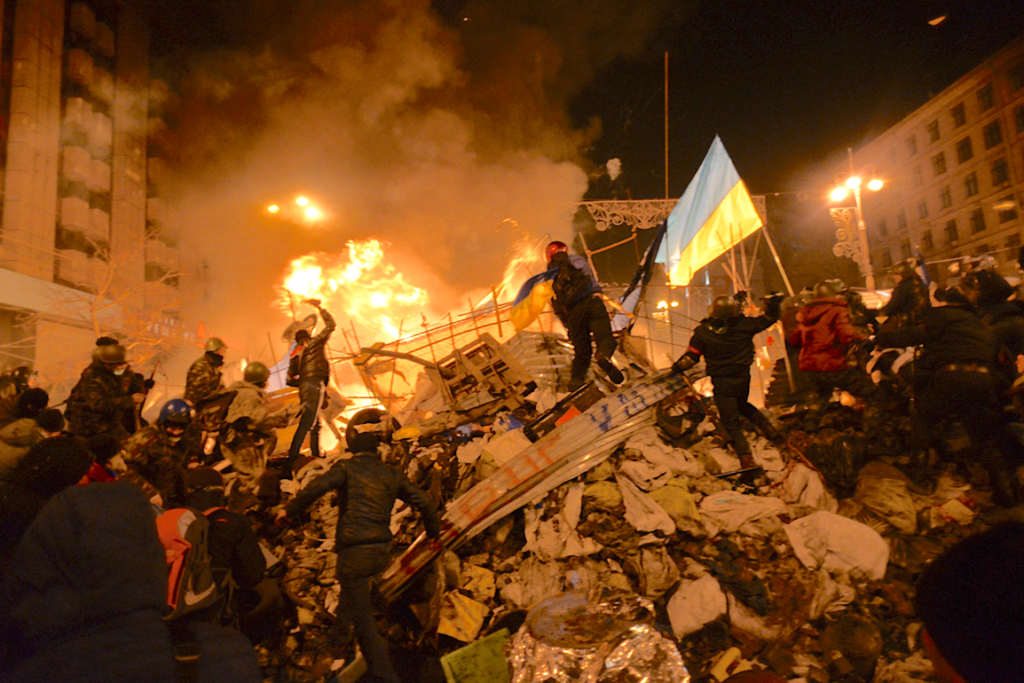
HOW TO FIND THE ENERGY
Meanwhile, Putin’s most powerful weapon remains his iron-hard grip on energy supplies. In Kubilius’ home country, Lithuania, the reliance on Moscow is a massive problem. Former Energy Minister Arvydas Sekmokas has called for urgent attempts to find a solution. His greatest concern is Lithuania’s dependence “on the control room in Moscow”, as he has put it. He says it’s urgent for Lithuania to disconnect from the BRELL electricity supply ring while Russia is bogged down in Ukraine. He added that: “we need to look for new ways to get more electricity quickly because electricity will not go up, demand will not go down, and there is no plan on what we will do.” Lithuania has an unfortunate history where nuclear power is concerned. It started construction on two power stations, using RBMK reactors, in 1978, but they used the same technology as Chernobyl of evil memory. To join the EU, Lithuania was obliged to shut them down, accepting US$36.8-million (€36.35-million) to improve safety at the Ignalina site. The shut-down came as a blow because Lithuania was a net exporter of energy. Public support for EU membership was greatly reduced and plans for a replacement nuclear plant were shelved permanently. There are other hints of a power plant to come, however, and Kubilius and Sekmokas have said that they hope an agreement with Hitachi-GE Nuclear Energy on the main provisions can be signed later this year.
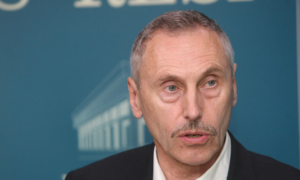
Did Putin realise how widely the effects of his unwarranted invasion of Ukraine would spread? Possibly not, although if he had it would not have put him off. He likes causing chaos and sees it as one of his principal weapons in the war. Any war. I visited Lithuania’s Ignalina nuclear power plant with a cameraman many years ago and work was proceeding to shut it down and clean up. Andrius Kubilius and Arvydas Sekmokas hope that the agreement with Hitachi-GE Nuclear Energy on the main provisions for a new power plant will be signed this year. Arvydas Sekmokas says that the agreement is important for regional partners, moreover, he did not rule out that Lithuania’s share in the future project may change. “The concession commission approved the main provisions of the concession contract. I believe that if the Government approves it at the meeting and meeting next week, it will be possible to sign those basic provisions with the strategic investor in the near future.” Let’s hope so. Otherwise, Lithuania could be facing a very cold winter while Ukraine tidies up a rather hot conflict. Kubilius will continue, no doubt, to strive for a better future for his country and to defy the Kremlin. Putin cannot hold on forever.

